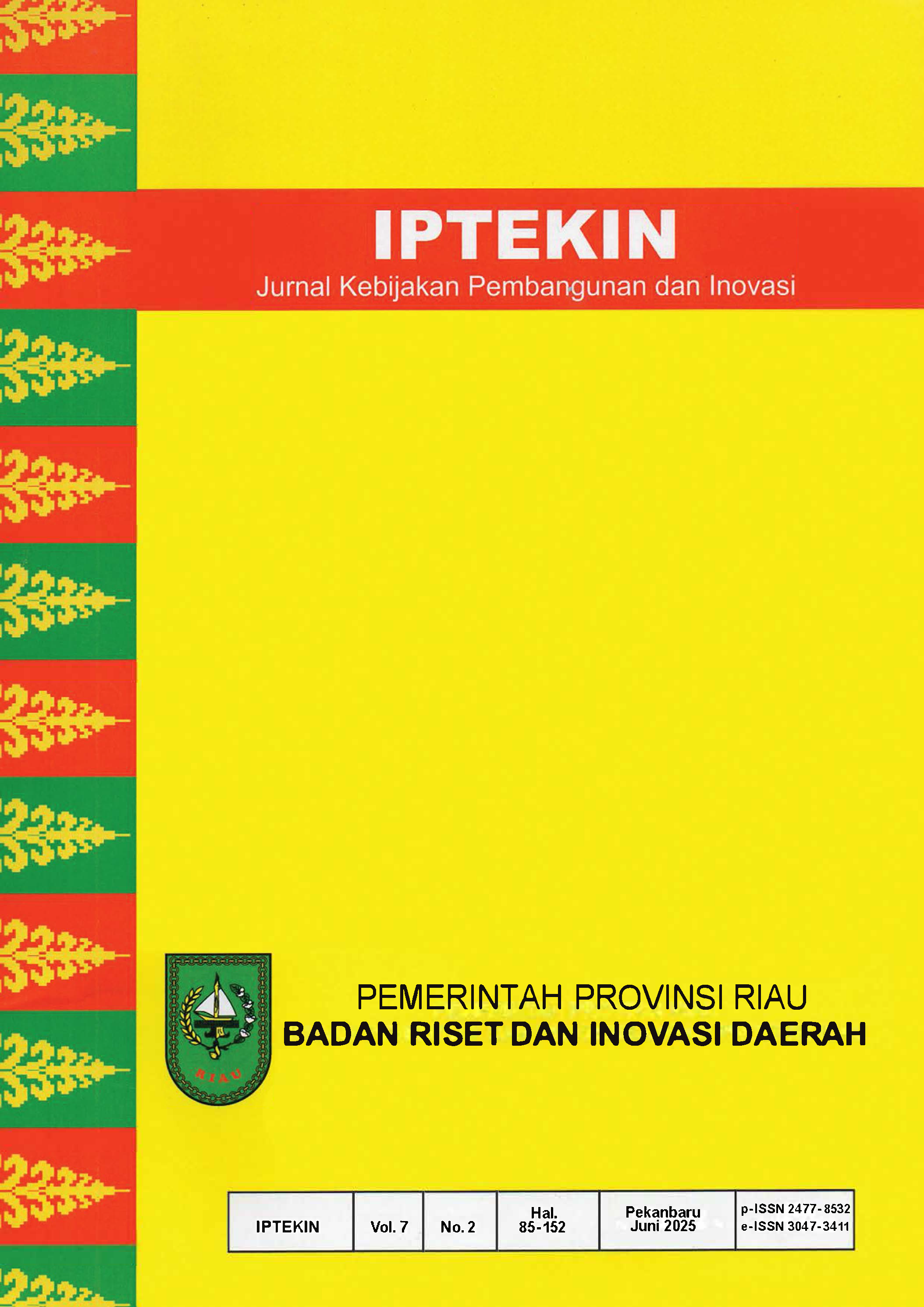Dampak Kebijakan Peraturan Daerah (Perda) Nomor 8 Tahun 2020 Tentang Rencana Tata Ruang Wilayah RTRW Di Kabupaten Kepulauan Meranti
Main Article Content
Abstract
The policy of prohibiting the planting of commodities that absorb large amounts of water is a strategic step taken by the local government in order to control the rate of environmental damage. This research aims to: 1. Knowing people's perceptions related to Regional Regulation (PERDA) Number 8 of 2020 concerning the Regional Spatial Plan of the Meranti Islands Regency RTRW, and 2. Analyzing the socio-economic impact of PERDA RTRW concerning the Regional Spatial Plan of the Meranti Islands Regency RTRW. This research used a qualitative descriptive method with data collection techniques through surveys and interviews and data analysis using Likert Summated Rating (LSR). The results of the study found that 1) 46.66 percent of people agree with the existence of PERDA RTRW concerning the Regional Spatial Plan of the Meranti Islands Regency RTRW, because it is able to protect the environment from damage arising from oil palm planting in the Meranti Islands Regency area. While 30.00 percent of the community chose strongly disagree with the existence of this policy because it was considered an obstacle to grow and rise from the economic downturn in the coastal area 2). The social impact of this policy is 46.66 percent of the community stated that the existence of this policy has caused differences in views between residents, especially the pros and cons of the prohibition of oil palm planting. Changes in social structure occur when community groups are divided into those who are adaptive to policies and those who are economically marginalized. The economic impact of the ban on oil palm planting in the Meranti Islands Regency area is that 50 percent of the community experienced a decrease in income potential because they could not continue their plans to plant oil palm. The palm oil ban eliminates the potential for new livelihoods that are considered promising.
Article Details

This work is licensed under a Creative Commons Attribution-ShareAlike 4.0 International License.
References
Azzahrawaani, R., Amalia, P., Putri, A. C. P., Illahi, R. R., & Krisyanto, K. (2024). Persepsi Masyarakat Terhadap Efektivitas Kebijakan Program Pemerintah Kelurahan Pada Studi Kasus Tugu Utara. Journal of International Multidisciplinary Research Persepsi, 2(12), 1–15.
BAPPENAS. (2019). Rancangan Teknokratik Rencana Pembangunan Jangka Menengah Nasional (RPJMN) 2020-2024. In Kementrian Perencanaan Pembangunan Nasional.
BPS Provinsi Riau. (2024). Provinsi Riau Dalam Angka 2024.
Chambers, R., & Conway, G. R. (1992). Sustainable rural livelihoods: practical concepts for the 21st century. IDS Discussion Paper, 296(January 1992).
Ellis, F. (2000). The determinants of rural livelihood diversification in developing countries. Journal of Agricultural Economics, 51(2), 289–302. https://doi.org/10.1111/j.1477-9552.2000.tb01229.x
Euler, M., Krishna, V., Schwarze, S., Siregar, H., & Qaim, M. (2017). Oil Palm Adoption, Household Welfare, and Nutrition Among Smallholder Farmers in Indonesia. World Development, 93(September), 219–235. https://doi.org/10.1016/j.worlddev.2016.12.019
Fadli, R., Noor, T. I., & Isyanto, A. Y. (2019). Dampak Sosial Ekonomi Pembangunan Waduk Jatigede Terhadap Masyarakat Tanu di Kabupaten Sumedang (Suatu Kasus di Blok Pasirkanaga Desa Tarunajaya Kecamatan Darmaraja Kabupaten Sumedang). Jurnal Ilmiah Mahasiswa Agroinfo Galuh, 6(3), 552. https://doi.org/10.25157/jimag.v6i3.2517
Fitriana, N. (2022). Pengaruh Subsektor Pertanian Terhadap PDRB Provinsi Riau [Universitas Riau]. https://repository.uir.ac.id/15149/%0Ahttps://repository.uir.ac.id/15149/1/185110442.pdf
Gunawan, H., Yeny, I., Karlina, E., Suharti, S., Murniati, Subarudi, Mulyanto, B., Ekawati, S., Garsetiasih, R., Pratiwi, Sumirat, B. K., Sawitri, R., Heriyanto, N. M., Takandjandji, M., Widarti, A., Surati, Desmiwati, Kalima, T., Effendi, R., … Nurlia, A. (2022). Integrating Social Forestry and Biodiversity Conservation in Indonesia. Forests, 13(12), 1–27. https://doi.org/10.3390/f13122152
Hafsari, T. A. (2024). Tinjauan Buku: Di Balik Konflik Sawit yang Tak Kunjung Usai: Hak, Kuasa, dan Kehidupan Masyarakat Lokal. Jurnal Masyarakat Indonesia, 50(2), 335–344. https://doi.org/10.55981/jmi.2024.8897
Hamidi, M. R., Hadi, S., & Septya, F. (2024). Analisis Pembiayaan Sertifikasi Indonesia Sustainable Palm Oil (ISPO) Oleh Pekebun Kelapa Sawit Swadaya di Kabupaten Pelalawan. Jurnal Agri Sains, 8(2), 227–243. https://doi.org/http://ojs.umb-bungo.ac.id/index.php/JAS/index
Katuuk, M. E., Masengi, A. S. R., & Supit, O. E. (2023). Persepsi Dan Kesiapan Diri Mahasiswa Fakultas Kedokteran Terhadap Implementasi Interprofessional Education Di Universitas Sam Ratulangi Manado. Jurnal Ilmiah Keperawatan IMELDA, 9(1), 55–61. https://doi.org/10.52943/jikeperawatan.v9i1.1249
Marti, S. (2008). Losing ground: The human rights impact of oil palm plantation expansion in Indonesia. Environment: Science and Policy for Sustainable …, February, 1–108. http://www.tandfonline.com/doi/pdf/10.1080/00139157.1976.9930747
Rai, A. (2016). Respon Pertumbuhan Ekonomi Terhadap Pengaruh Dari Sektor Pertanian. Jurnal Ekonomi Pertanian Dan Agribisnis (JEPA), 6(3), 1123–1133. https://doi.org/https://doi.org/10.21776/ub.jepa.2022.006.03.31
Rist, L., Feintrenie, L., & Levang, P. (2010). The livelihood impacts of oil palm: Smallholders in Indonesia. Biodiversity and Conservation, 19(4), 1009–1024. https://doi.org/10.1007/s10531-010-9815-z
RPPEG Provinsi Riau. (2021). Rencana Perlindungan dan Pengelolaan Ekosistem Gambut Provinsi Riau Tahun 2021-2025.
Saihuna, Hafiz, A. P., & Subhan, M. (2024). Dampak Konversi Lahan Perkebunan Kelapa Lokal menjadi Perkebunan Kelapa Sawit dalam Perspektif Ekonomi Syariah di Desa Kuala Keritang, Indragiri Hilir, Riau. Nuansa, 2(3), 232–248.
Sudharto, P. H. (1995). Aspek Sosial Amdal. Gadjah Mada University Press.
Susanti, A., & Maryudi, A. (2016). Development Narratives, Notions of Forest Crisis, and Boom of Oil Palm Plantations in Indonesia. Forest Policy and Economics, 73, 130–139. https://doi.org/10.1016/j.forpol.2016.09.009
Utami, R., Kumala Putri, E. I., & Ekayani, M. (2017). Economy and Environmental Impact of Oil Palm Palm Plantation Expansion (Case Study: Panyabungan Village, Merlung Sub-District, West Tanjung Jabung Barat District, Jambi). Jurnal Ilmu Pertanian Indonesia, 22(2), 115–126. https://doi.org/10.18343/jipi.22.2.115

